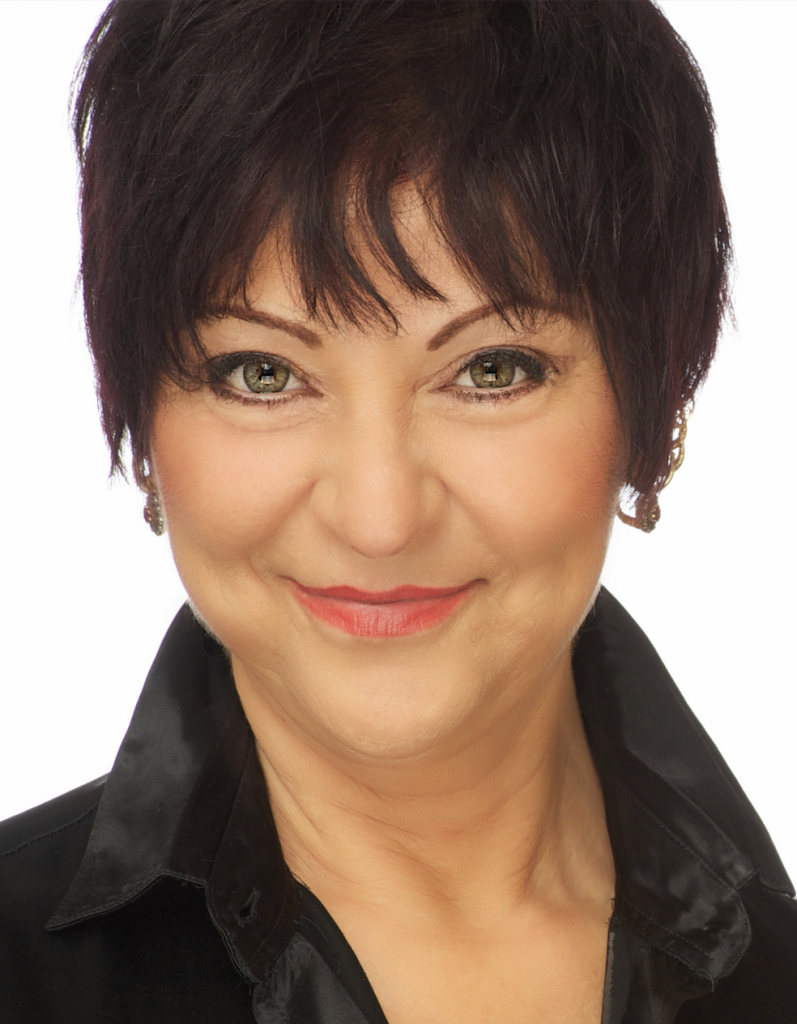The WiMN’s Front and Center is a weekly column that showcases accomplished women who work in the music and audio industries. We spotlight successful female performers, manufacturers, retailers, educators, managers, publicists, and everyone else in between. Want to be featured? Learn how here.
Front and Center: Celebrity Voice and Performance Coach, Jeannie Deva

Jeannie Deva is one of the country’s most respected celebrity vocal coaches.
Creator of The Deva Method, this highly effective approach to singing helps contemporary vocalists sing passionately without the risk of vocal blow-out. With her method, Deva has helped many of today’s most well-known vocalists to reach their peak performance level.
In fact, The Deva Method has become so successful that she has trained a number of teachers in order to keep up with the demand. She also maintains The Jeannie Deva Voice Studios, a facility opened in 1978 to help popular music singers achieve their full potential.
In addition to her vocal instruction, Deva often accompanies artists in the recording studio, aiding in vocal production and much more. She’s also a writer and singer gear reviewer – it seems there’s never a dull moment in Deva’s schedule!
Currently, Jeannie Deva teaches privately in Los Angeles, CA and worldwide. You can find out more at jeanniedeva.com.
WiMN: What influenced you to become a singer?
JD: My family and their circle of friends were my biggest influence. Surrounded by amazing artists from the start, involvement in the arts for me was a way of life. My mother was a Broadway actress who then became a theater director and was my first acting teacher when I was eight years old. My father was an award-winning writer and sculptor. One of my grandmothers was the rehearsal pianist for Arthur Rubenstein’s Master Work Choir with whom I began taking piano lessons at age five. My sister is a renowned violinist, composer, author and teacher who regularly tours to give master workshops.
Many of my extended family members were professional singers and managers of musical acts, and most of my parents’ friends were acclaimed professionals in their respective fields of the performing and visual arts. My youth was spent learning from these people and attending inspirational concerts and music festivals. Early childhood memories include sitting on the lap of blues great Josh White while he sang impromptu at a picnic for friends and family, plus sitting in on jams at music festivals with Bonnie Raitt, James Taylor, Muddy Waters and many others.
I studied piano, guitar, singing, dance and acting, but one day while living in Northern California, I recognized that I felt the most alive and focused when I sang. I decided to use my dance and theater training and performance experience to enhance my performance as a singer. And with that, I left the theater and dance troupe I was part of, flew to Boston, and after a short interview with the Dean, was accepted into Berklee College of Music in Boston, MA.
Watch Deva perform a rock version of a Sir Walter Raleigh’s poem, “On the Life of Man”:
WiMN: Tell us about The Deva Method and the Jeannie Deva Voice Studios.
JD: The Deva Method provides a singer with vocal freedom. This includes the ability to sing the styles of your own choosing and to sing the way YOU want to sing. It does not make you sound the way the teacher or the technique wants you to sound. It opens the doors of expressive, passionate singing.
It is a natural method that is based on the way the human body works to produce sound. Once you understand the simple factual basics of how your voice functions, you can recognize anything you may be doing that is making singing more difficult, correct it and sing in worry-free harmonious alignment with your body.
To develop the Deva Method I had to do my own research of vocal anatomy in medical books and journals. It was not an easy task but a necessary one. None of the voice teachers I had studied with had ever taught me the simple facts of my instrument. I had been given directions that had to do with things like “the diaphragm” and how to breathe, but I didn’t have enough factual information to know for myself if those directions were correct. Some of them only served to confuse and complicate singing, and the worst part was that midst all the confusion and contrary directions, I had lost the joy of singing.
Because my method is based on the actuality of the human voice and not opinion, it is effective, and so demand for it continues to grow. To forward my goal of helping as many singers as I possibly can, in 1988 I established a Deva Method® teacher training and certification program.
In 1991 I took on a manager – who is still with me – and opened Jeannie Deva® Voice Studios. Together with several certified Deva Method® teachers in a professional office building near the Berklee College of Music campus, we coached over 100 singers per week, many of whom were flying in from various parts of the USA, Europe and South America. Today, while teaching from my private Los Angeles, California studio, I continue to train and certify voice teachers in places as distant as Sidney, Australia.
Watch Deva’s coaching style below:
WiMN: You’ve helped many well-known musicians improve their voice. Any memorable stories you’d like to share?
JD: Yes, it’s been my pleasure to work with so many amazing singers. Well-known singers may be dissuaded from taking voice lessons because of the public’s perception that they’re “supposed” to already be at the top of their game. Taking voice lessons can be equated with being less than a great singer. That is not true and I applaud any well-known singer who studies voice to widen their horizons and realize even more artistic potential.
Back in the 1990’s I was working with some members of the iconic J Geils Band, and this reservation about vocal coaching was brought up. Finally, it was realized that pro athletes have coaches that help them stay in top condition, so I was given the nickname “The Voice Doctor.” In the spirit of keeping it fun, whenever I entered the room, they would stand up and announce: “The Doctor is in the house!”
A couple of years ago, a vocalist in Mexico who had been the number one singer in that country – with a total of 11 songs on the Latin Music charts at the same time – began suffering severe vocal difficulties and he was considering surgery. A friend of mine who had produced this singer told me about him. That night I dreamt about the singer and the next day his manager called me!
Long story short, he came to LA for two months of intensive lessons. After a 20-year successful career as the most popular Mexican crooner, one could expect that he would be a bit of a diva, but instead he was a humble down-to-earth person. He was a dream to work with. During our two months of vocal therapy and coaching, his voice improved from barely being able to sing a 4-note range to full vocal recovery in time to sing two major shows in Mexico – which were recorded for a live album. Shortly after those shows he was invited to fly to Rome to sing for the Pope. He was thrilled with the results and it was an extremely gratifying outcome for both of us.
WiMN: Can you tell us one simple tip that is very often overlooked?
JD: Breathe into your lower back!
Singers are often told “fill your stomach with air.” Or “Your diaphragm is like a balloon,” as the teacher pats the stomach/abdomen indicating the supposed location of the diaphragm, saying “breathe into your diaphragm.” But, the physical facts are that the diaphragm is NOT a balloon and it does NOT fill with air. It is NOT that low in the body, but is much higher in the torso than the abdomen.
When you breathe, air goes into and out of the lungs and nowhere else. The largest part of the lungs is located in the mid and lower back. Because breathing into the back aligns with human anatomy, it avoids the abdominal manipulation some singers become preoccupied with and resultant throat tension. The difference I’ve heard in singers’ voices JUST by breathing into the lower back while letting the ribcage open naturally has been quite wonderful and often dramatic.
WiMN: What advice do you have for a young woman pursuing a career as a professional vocalist?
JD: Be a problem solver and adopt a positive “I can” attitude. Negativity begets negativity and failure, while positivity overcomes barriers resulting in success. Surround yourself with positive and supportive people.
If any of your family members are opposed to your singing career, figure out how to discuss this (not argue) with the end goal in mind of receiving their agreement. If singing is integral to a fulfilled and happy life for you, they are not likely to object as long as you can support yourself and don’t cause them any worry about your welfare.
The old adage “knowledge is power” is true. There is a lot to know in order to achieve and maintain a professional career as a vocalist. Always challenge yourself to learn the next thing. Make sure you really understand what you’re learning.
WiMN: Can you share your experience as a woman in the industry? Have there been challenges?
JD: There are times when I’ve been in challenging situations with men as well as women. People are people. Usually the ones that are asserting themselves with “testosterone” do so to mask a lack of self-confidence. I’ve learned how to not push people’s buttons – and what to do when mine are pushed – so that I can be the bigger person when needed and create a teammate relationship. And for the occasional person who just isn’t healthy to be around, I have learned when to sever ties and walk away.
I’ve also found that the more I’ve learned about the field of music and my craft; electronic singer-gear used on stage and in the recording studio, the more confidence I’ve gained in myself and the more respect I’ve received from my peers.
WiMN: What’s in store for you for the rest of 2014?
JD: So far the year has begun with a whirlwind of activity and promises to become busier. I was invited into the recording studio to sing on the title track of Paul Gilbert’s forthcoming album, and I’m looking forward to doing more studio vocal work during the remainder of this year. I also did preproduction and recording studio vocal production for two singers’ album projects and I’m anticipating more producer work later this year too.
I do testing and reviews of singer-gear such as Sennheiser headphones for use in the recording studio for vocal production. Next I’ll be testing two new products by TC-Helicon: their VoiceSolo FX150 Personal PA & Vocal Processor, and the VoiceLive3 vocal effects pedal. I’m a blogger for Music Connection Magazine and contribute new content bi-monthly. They just featured a full page article of mine in their May issue called “Singers! Hear Yourself Above the Band!”
In June, Voicecouncil.com – an online magazine and singer community – is bringing me back for my fifth time as their vocal coach in residence. This is a month-long residency during which I provide singing tips and short critiques of submitted performance videos.
All of this is in addition to vocal coaching about 15 to 20 singers weekly in private lessons in my Los Angeles voice studio, as well as about 150 singers around the world in my ArtistWorks video exchange online vocal school. I’m in the midst of revamping my Deva Method teacher training program with many new techniques I’ve created over the past six months, and I have two new trainees enrolled in my remote teacher training program who are helping me beta test the curriculum.
As a member of The Recording Academy, there’s a possibility that this fall I’ll be going to their first ever GRAMMY Festival at Sea “Women Who Rock” cruise to cover it as a journalist for a music magazine. So yes, it’s looking like a very busy year indeed!
For more information about Jeannie Deva and her in-person or online services and voice enhancing products, visit www.JeannieDeva.com.








